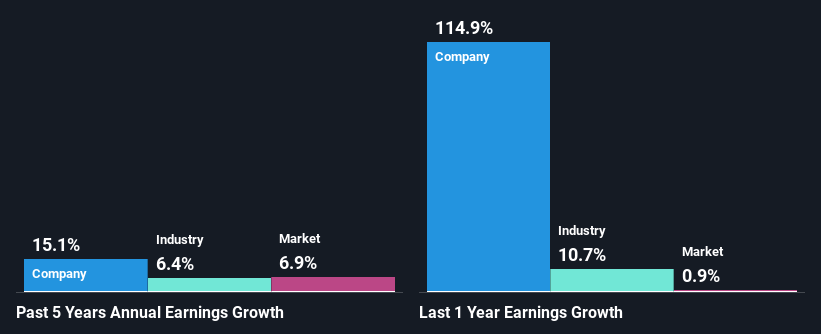Will Weakness in Beijing Roborock Technology Co., Ltd.'s (SHSE:688169) Stock Prove Temporary Given Strong Fundamentals?
With its stock down 24% over the past three months, it is easy to disregard Beijing Roborock Technology (SHSE:688169). However, stock prices are usually driven by a company’s financial performance over the long term, which in this case looks quite promising. Specifically, we decided to study Beijing Roborock Technology's ROE in this article.
Return on equity or ROE is a key measure used to assess how efficiently a company's management is utilizing the company's capital. In short, ROE shows the profit each dollar generates with respect to its shareholder investments.
See our latest analysis for Beijing Roborock Technology
How To Calculate Return On Equity?
ROE can be calculated by using the formula:
Return on Equity = Net Profit (from continuing operations) ÷ Shareholders' Equity
So, based on the above formula, the ROE for Beijing Roborock Technology is:
19% = CN¥2.2b ÷ CN¥12b (Based on the trailing twelve months to March 2024).
The 'return' is the income the business earned over the last year. So, this means that for every CN¥1 of its shareholder's investments, the company generates a profit of CN¥0.19.
What Has ROE Got To Do With Earnings Growth?
So far, we've learned that ROE is a measure of a company's profitability. Depending on how much of these profits the company reinvests or "retains", and how effectively it does so, we are then able to assess a company’s earnings growth potential. Assuming all else is equal, companies that have both a higher return on equity and higher profit retention are usually the ones that have a higher growth rate when compared to companies that don't have the same features.
A Side By Side comparison of Beijing Roborock Technology's Earnings Growth And 19% ROE
To begin with, Beijing Roborock Technology seems to have a respectable ROE. Further, the company's ROE compares quite favorably to the industry average of 11%. This certainly adds some context to Beijing Roborock Technology's decent 15% net income growth seen over the past five years.
As a next step, we compared Beijing Roborock Technology's net income growth with the industry, and pleasingly, we found that the growth seen by the company is higher than the average industry growth of 6.4%.

The basis for attaching value to a company is, to a great extent, tied to its earnings growth. The investor should try to establish if the expected growth or decline in earnings, whichever the case may be, is priced in. Doing so will help them establish if the stock's future looks promising or ominous. Is Beijing Roborock Technology fairly valued compared to other companies? These 3 valuation measures might help you decide.
Is Beijing Roborock Technology Efficiently Re-investing Its Profits?
Beijing Roborock Technology's three-year median payout ratio to shareholders is 10% (implying that it retains 90% of its income), which is on the lower side, so it seems like the management is reinvesting profits heavily to grow its business.
Additionally, Beijing Roborock Technology has paid dividends over a period of four years which means that the company is pretty serious about sharing its profits with shareholders. Looking at the current analyst consensus data, we can see that the company's future payout ratio is expected to rise to 30% over the next three years. Regardless, the ROE is not expected to change much for the company despite the higher expected payout ratio.
Conclusion
On the whole, we feel that Beijing Roborock Technology's performance has been quite good. In particular, it's great to see that the company is investing heavily into its business and along with a high rate of return, that has resulted in a sizeable growth in its earnings. The latest industry analyst forecasts show that the company is expected to maintain its current growth rate. To know more about the company's future earnings growth forecasts take a look at this free report on analyst forecasts for the company to find out more.
Have feedback on this article? Concerned about the content? Get in touch with us directly. Alternatively, email editorial-team (at) simplywallst.com.
This article by Simply Wall St is general in nature. We provide commentary based on historical data and analyst forecasts only using an unbiased methodology and our articles are not intended to be financial advice. It does not constitute a recommendation to buy or sell any stock, and does not take account of your objectives, or your financial situation. We aim to bring you long-term focused analysis driven by fundamental data. Note that our analysis may not factor in the latest price-sensitive company announcements or qualitative material. Simply Wall St has no position in any stocks mentioned.
 Index Options
Index Options CME Group
CME Group Nasdaq
Nasdaq Cboe
Cboe TradingView
TradingView Wall Street Journal
Wall Street Journal